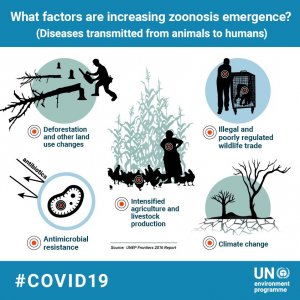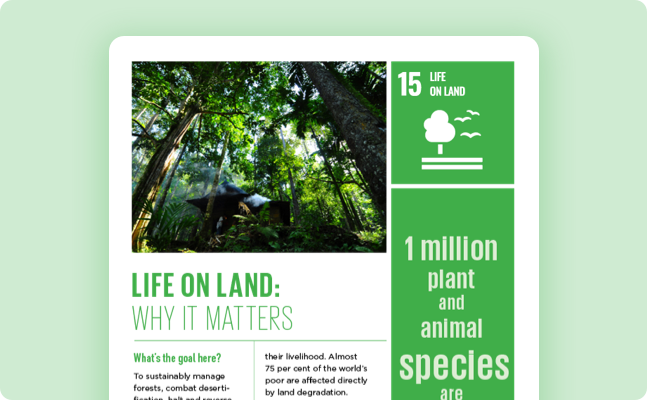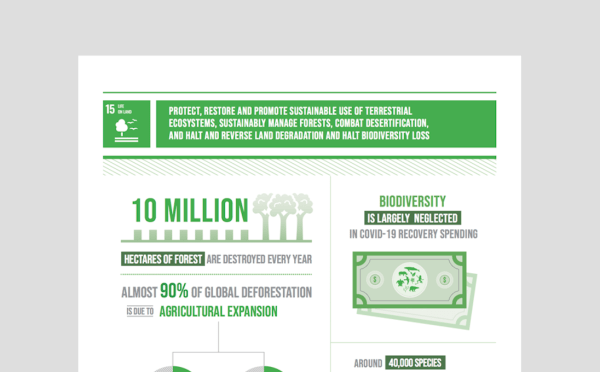Goal 15 is about conserving life on land. It is to protect and restore terrestrial ecosystems, sustainably manage forests, combat desertification, and halt and reverse land degradation and stop biodiversity loss. Healthy ecosystems and the biological diversity they support are a source of food, water, medicine, shelter and other material goods. They also provide ecosystem services – the cleaning of air and water – which sustain life and increase resiliency in the face of mounting pressures.
Nevertheless, human activities have profoundly altered most terrestrial ecosystems: around 40,000 species are documented to be at risk of extinction over the coming decades, 10 million hectares of forest (an area the size of Iceland) are being destroyed each year, and more than half of key biodiversity areas remain unprotected.

- Forest cover fell from 31.9 per cent of total land area in 2000 to 31.2 per cent in 2020, a net loss of almost 100 million hectares.
- Agricultural expansion is driving almost 90 per cent of global deforestation, including 49.6 per cent from expansion for cropland and 38.5 per cent for livestock grazing.
- Between 2010 and 2021, the area of forest land under certification schemes increased by 35 per cent. The proportion of forests under a long-term management plan increased from 54 per cent in 2010 to 58 per cent in 2020.
- More than 700 million hectares of forest (18 per cent) were in legally established protected areas in 2020.
- Human activities such as logging and farming are encroaching upon habitats, putting about 20 per cent of reptile species at risk.
- Globally, the mean percentage coverage of key biodiversity areas increased from over one quarter in 2000 to nearly one half in 2021.
- More and more countries are establishing national targets for incorporating ecosystem and biodiversity values into their accounting and reporting systems. By January 2022, 37 per cent of countries assessed are on track to achieve or exceed their national targets.
15.1 By 2020, ensure the conservation, restoration and sustainable use of terrestrial and inland freshwater ecosystems and their services, in particular forests, wetlands, mountains and drylands, in line with obligations under international agreements
15.2 By 2020, promote the implementation of sustainable management of all types of forests, halt deforestation, restore degraded forests and substantially increase afforestation and reforestation globally
15.3 By 2030, combat desertification, restore degraded land and soil, including land affected by desertification, drought and floods, and strive to achieve a land degradation-neutral world
15.4 By 2030, ensure the conservation of mountain ecosystems, including their biodiversity, in order to enhance their capacity to provide benefits that are essential for sustainable development
15.5 Take urgent and significant action to reduce the degradation of natural habitats, halt the loss of biodiversity and, by 2020, protect and prevent the extinction of threatened species
15.6 Promote fair and equitable sharing of the benefits arising from the utilization of genetic resources and promote appropriate access to such resources, as internationally agreed
15.7 Take urgent action to end poaching and trafficking of protected species of flora and fauna and address both demand and supply of illegal wildlife products
15.8 By 2020, introduce measures to prevent the introduction and significantly reduce the impact of invasive alien species on land and water ecosystems and control or eradicate the priority species
15.9 By 2020, integrate ecosystem and biodiversity values into national and local planning, development processes, poverty reduction strategies and accounts
15.A Mobilize and significantly increase financial resources from all sources to conserve and sustainably use biodiversity and ecosystems
15.B Mobilize significant resources from all sources and at all levels to finance sustainable forest management and provide adequate incentives to developing countries to advance such management, including for conservation and reforestation
15.C Enhance global support for efforts to combat poaching and trafficking of protected species, including by increasing the capacity of local communities to pursue sustainable livelihood opportunities
COVID-19 response

In 2016, the United Nations Environment Programme (UNEP) flagged a worldwide increase in zoonotic epidemics as an issue of concern. Specifically, it pointed out that 75 per cent of all emerging infectious diseases in humans are zoonotic and that these zoonotic diseases are closely interlinked with the health of ecosystems.
“In COVID-19, the planet has delivered its strongest warning to date that humanity must change,” said UNEP Executive Director Inger Andersen.
In Working With the Environment to Protect People, UNEP lays out how to “build back better” – through stronger science, policies that back a healthier planet, and more green investments.
UNEP’s response covers four areas:
- Helping nations manage COVID-19 waste,
- Delivering a transformational change for nature and people,
- Working to ensure economic recovery packages create resilience to future crises, and
- Modernizing global environmental governance.
 To prevent, halt and reverse the degradation of ecosystems worldwide, the UN has launched a Decade on Ecosystem Restoration (2021-2030). This globally-coordinated response to the loss and degradation of habitats will focus on building political will and capacity to restore humankind’s relation with nature. It is also a direct response to the call from science, as articulated in the Special Report on Climate Change and Land of the Intergovernmental Panel on Climate Change, and to the decisions taken by all UN Member States in the Rio Conventions on climate change and biodiversity, and the UN Convention to Combat Desertification.
To prevent, halt and reverse the degradation of ecosystems worldwide, the UN has launched a Decade on Ecosystem Restoration (2021-2030). This globally-coordinated response to the loss and degradation of habitats will focus on building political will and capacity to restore humankind’s relation with nature. It is also a direct response to the call from science, as articulated in the Special Report on Climate Change and Land of the Intergovernmental Panel on Climate Change, and to the decisions taken by all UN Member States in the Rio Conventions on climate change and biodiversity, and the UN Convention to Combat Desertification.
Work on a new and ambitious post-2020 Global Biodiversity Framework is also underway.
As the world responds to and recovers from the current pandemic, it will need a robust plan for protecting nature, so that nature can protect humanity.
Related news
Trafficking in the Sahel: Gas lighting
Kourou/Koualou, a tiny village in a neutral zone straddling Benin and Burkina Faso, was the centre of a one-million-litre-a-year cross-border illicit fuel trade, a snapshot of a phenomenon that spreads far across the 6,000-kilometre-wide African Sahel region.
US state abortion bans ‘putting millions of women and girls at risk’
Millions of women and girls across the United States have suffered an alarming deterioration in access to sexual and reproductive healthcare, following the US Supreme Court decision overturning the constitutional right to abortion in June [...]
Related videos
Trafficking in the Sahel: Gas lighting
Kourou/Koualou, a tiny village in a neutral zone straddling Benin and Burkina Faso, was the centre of a one-million-litre-a-year cross-border illicit fuel trade, a snapshot of a phenomenon that spreads far across the 6,000-kilometre-wide African Sahel region.
US state abortion bans ‘putting millions of women and girls at risk’
Millions of women and girls across the United States have suffered an alarming deterioration in access to sexual and reproductive healthcare, following the US Supreme Court decision overturning the constitutional right to abortion in June [...]





